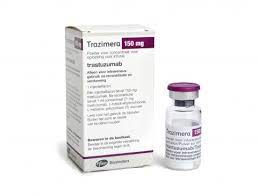- Bone Health
- Immunology
- Hematology
- Respiratory
- Dermatology
- Diabetes
- Gastroenterology
- Neurology
- Oncology
- Ophthalmology
- Rare Disease
- Rheumatology
Molecular Selection Boosts pCR Rate in Early Breast Cancer Trial
Investigators said pathologic complete response (pCR) improved in a trastuzumab biosimilar/pertuzumab trial when patients were preselected for a subtype of breast cancer.
Biosimilars employed in clinical studies may reduce the costs of those studies, relative to using reference brand drugs. As clinical research tools, they may also provide answers to questions about appropriate therapy.
When it comes to treatment for breast cancer, investigators used biosimilar trastuzumab (Trazimera) to help understand whether a genetically targeted population of patients would benefit from a de-escalation of standard therapy by leaving out chemotherapy.
Improved outcomes have been derived from the addition of human epidermal growth factor receptor 2 (HER2)–targeted therapies to conventional chemotherapy, although patients sometimes are overtreated with combination therapies or suffer adverse events that might otherwise be avoided.
In KEYRICHED-1 (NCT03988036), a prospective phase 2 trial, investigators sought to determine whether comparable pathologic complete response (pCR) rates could be achieved in the neoadjuvant setting without a chemotherapy therapeutic component in patients with HER2-positive early breast cancer (EBC).
For this study, investigators enrolled patients with HER2-enriched (HER2-E) EBC, because this PAM50 molecular subtype of HER2-positive breast cancer is associated with higher pCR rates following anti–HER2-based treatment. In other words, this subgroup of patients was more likely to respond well to de-escalated treatment.
In this single-arm study, investigators enrolled pre- and postmenopausal patients (N = 48) with newly diagnosed HER2-postive stage I-III EBC with immunohistochemical (IHC) expression 2+ or 3+ and HER2-E subtype by PAM50.
Treatment consisted of 4 cycles (every 21 days) of the following:
- Pembrolizumab (200 mg)
- Trastuzumab biosimilar (Trazimera, loading dose 8 mg/kg, maintenance dose 6 mg/kg)
- Pertuzumab (loading dose 840 mg/kg, maintenance dose 420 mg/kg)
Pembrolizumab is an immunotherapy that blocks the programmed cell death receptor (PD-1) from binding with the PD-L1/L2 ligands, thereby preventing the tumor cell from “switching off” the immune system response against the cancer.
Pertuzumab mutes the tumor cell signaling process by locking onto HER2-expressing cancer cells, thereby arresting their growth and inducing apoptosis, or cell death.
Trastuzumab is complementary in action to pertuzumab. It attaches to HER2 receptors on breast cancer cells and prevents them from receiving growth signals.
Trial enrollment was conducted between May 2020 and March 2021. Investigators said that of 98 patients initially screened, 52 (55%) had the HER2-E subtype by PAM50, and of those, 48 entered the treatment phase.
The median age of patients was 57; 65% had tumors larger than 2 cm and 30% were positive for lymph node involvement.
Investigators said the centrally confirmed pCR rate was 52% in 46 evaluable patients (a minimum pCR rate of 50% was predetermined for recruitment continuation).
“Despite the HER2-E subtype, no pCR was observed in 4 patients with IHC HER2 2+/fluorescence-in-situ hybridization (FISH)–positive status in contrast with 20/39 (51.2%) pCRs in HER2 3+ tumors,” authors of the study wrote.
They said the confirmed pCR rate for HER2-positive/hormone receptor (HR)–positive tumors was 38.5% vs 58.5% for HER2-positive/HR-negative tumors. They observed no new safety signals.
The investigators said the findings were favorable in comparison with those from the WSG-ADAPT HER2+/HR- trial, another de-escalation study, which compared trastuzumab and pertuzumab alone (dual blockade) with trastuzumab, pertuzumab, and paclitaxel in patients with HER2-positive/HR-negative EBC.
In WSG-ADAPT, investigators concluded that the addition of taxane therapy (paclitaxel/chemotherapy) to dual HER2 blockade over 3 months “substantially” increased pCR rates in HER2-postive/HR-negative EBC compared with dual blockade alone.
They said that in KEYRICHED-1, “The observed pCR rates compare favorably in HR-positive as well as HR-negative/ HER2-positive EBC. Moreover, KEYRICHED-1 demonstrates that with appropriate molecular patient selection, clinically meaningful pCR rates in the range of those obtained with longer, more toxic chemotherapy-containing regimens can be achieved.”
Reference
Kuemmel S, Gluz O, Reinisch M, et al. KEYRICHED-1 – a prospective, multicenter, open label, neoadjuvant phase II single arm study with pembrolizumab in combination with dual anti-HER2 blockade with trastuzumab and pertuzumab in early breast cancer patients with molecular HER2-enriched intrinsic subtype. Presented at: 2021 SABCS; December 7-10, 2021. https://www.abstractsonline.com/pp8/#!/10462/presentation/1034
Newsletter
Where clinical, regulatory, and economic perspectives converge—sign up for Center for Biosimilars® emails to get expert insights on emerging treatment paradigms, biosimilar policy, and real-world outcomes that shape patient care.

